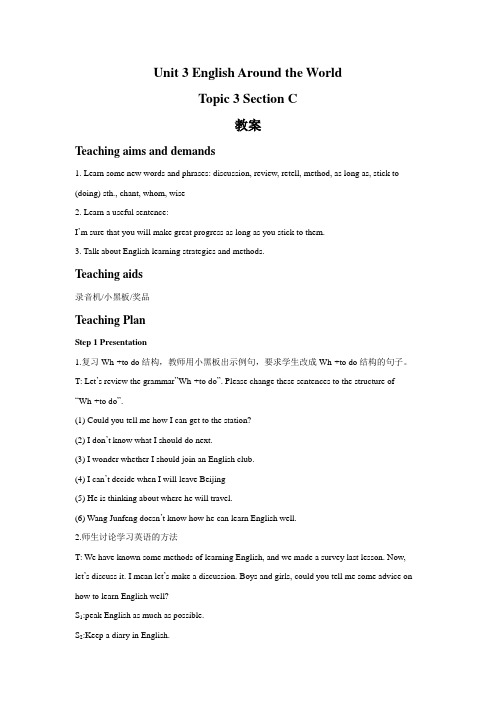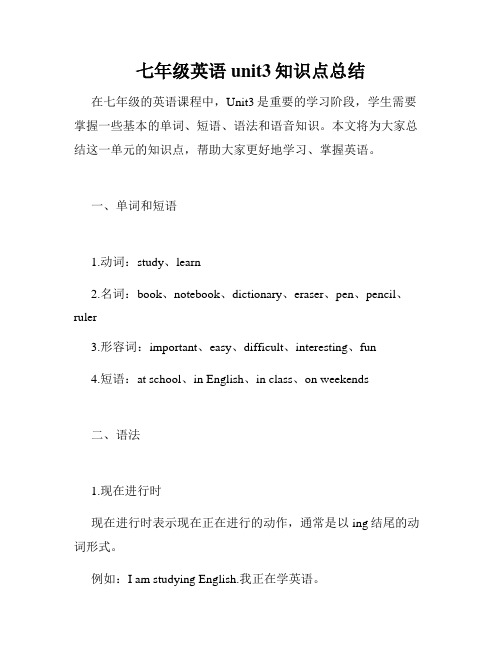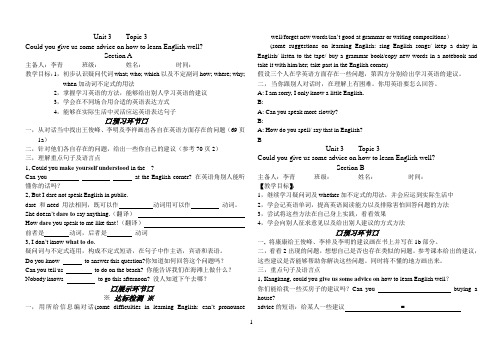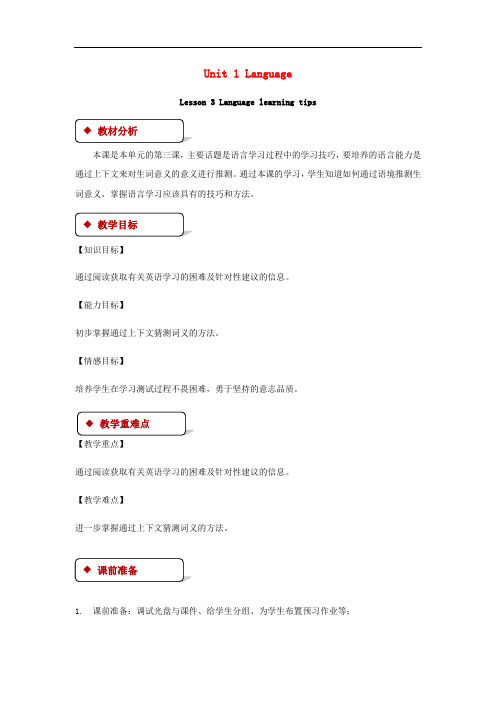Unit 3 Tips on Learning English
Unit 3 Topic 3 Could you give us some advice on how to learn English well Section C 教案

Unit 3 English Around the WorldTopic 3 Section C教案Teaching aims and demands1. Learn some new words and phrases: discussion, review, retell, method, as long as, stick to (doing) sth., chant, whom, wise2. Learn a useful sentence:I’m sure that you will make great progress as long as you stick to them.3. Talk about English learning strategies and methods.Teaching aids录音机/小黑板/奖品Teaching PlanStep 1 Presentation1.复习Wh-+to do结构,教师用小黑板出示例句,要求学生改成Wh-+to do结构的句子。
T: Let’s review the grammar”Wh-+to do”. Please change these sentences to the structure of “Wh-+to do”.(1) Could you tell me how I can get to the station?(2) I don’t know what I should do next.(3) I wonder whether I should join an English club.(4) I can’t decide when I will leave Beijing(5) He is thinking about where he will travel.(6) Wang Junfeng doesn’t know how he can learn English well.2.师生讨论学习英语的方法T: We have known some methods of learning English, and we made a survey last lesson. Now, let’s discuss it. I mean let’s make a discussion. Boys and girls, could you tell me some advice on how to learn English well?S1:peak English as much as possible.S:Keep a diary in English.…T:Yes, we can also preview the day’s lesson before class.T:S3, what is your opinion? That’s to say, what’s your learning method? Do you think review is a good method of learning English?S3:I think so.T:Do you want to know Kangkang’s and his classmates’ methods? OK, let’s listen to the tape.Step 2 Consolidation1. (师生探讨学习英语的方法,巩固1a。
七年级英语unit3知识点总结

七年级英语unit3知识点总结在七年级的英语课程中,Unit3是重要的学习阶段,学生需要掌握一些基本的单词、短语、语法和语音知识。
本文将为大家总结这一单元的知识点,帮助大家更好地学习、掌握英语。
一、单词和短语1.动词:study、learn2.名词:book、notebook、dictionary、eraser、pen、pencil、ruler3.形容词:important、easy、difficult、interesting、fun4.短语:at school、in English、in class、on weekends二、语法1.现在进行时现在进行时表示现在正在进行的动作,通常是以ing结尾的动词形式。
例如:I am studying English.我正在学英语。
2.一般现在时一般现在时表示经常、习惯性地发生的动作或状态。
例如:I go to school every day.我每天都上学。
3.人称代词人称代词是表示人的身份的代词,用来代替某个人或一组人。
例如:I(我)、you(你)、he(他)、she(她)、it(它)、we(我们)、they(他们)。
三、语音1.长音和短音长音和短音是英语中的两种基本发音方式,必须掌握。
例如:cat(短音)、cake(长音)2.重读音节在英语单词中,有些音节的发音比其他音节更强烈,这种音称为重读音节。
例如:computer(com-PUT-er)以上就是七年级英语Unit3的主要知识点总结,希望本文对大家的英语学习有所帮助。
在学习英语的过程中,要积极听、说、读、写,多练习,做到理论与实践相结合,才能在英语学习中获得更好的成就。
八年级上册英语unit3知识点总结

八年级上册英语unit3知识点总结Unit 3 Knowledge Summary for Grade 8 EnglishUnit 3 in the Grade 8 English curriculum covers a range of topics related to language use and communication. The following knowledge summary provides an overview of the key concepts and skills that students should master in this unit.1. VocabularyStudents will learn a range of new vocabularies related to everyday life, including family, education, health, and leisure activities. These vocabularies will significantly expand their communicative ability in English, increase their understanding of culture, and ultimately, help them use English more proficiently.2. GrammarIn Unit 3, students will focus on mastering different grammar concepts. These concepts include the use of the present simple and present continuous tenses, the correct use of adjectives, adverbs, andprepositions, and the formation of question forms. Students will also study common irregular verbs in English.3. Reading and WritingThe reading and writing skills students will learn in Unit 3 will help them become more critical readers and more effective writers. Students will learn how to analyze texts and identify the main ideas and themes in different types of texts. They will also learn how to use supporting evidence to reinforce their writing. Additionally, students will practice writing various forms of writing, including opinion pieces, descriptive writing, and persuasive writing.4. Speaking and ListeningIn Unit 3, students will also improve their speaking and listening skills. They will learn how to communicate effectively in a range of everyday situations, such as ordering food or asking for directions. They will also learn how to listen actively and ask questions to clarify information.5. CultureIn this unit, students will gain an understanding of cultural differences. They will learn about different customs, traditions, and values that exist in different parts of the world. They will also learn how these cultural differences can impact communication and how to communicate effectively across different cultures.In conclusion, Unit 3 in the Grade 8 English curriculum covers a range of essential language concepts that will help students develop their English skills further. Knowledge of vocabulary, grammar, reading, writing, speaking, listening, and culture will provide students with the necessary tools to communicate effectively in English, ultimately helping them succeed in their future studies and careers.。
Unit 3 Topic 3 Could you give us some advice on h

Unit 3 Topic 3Could you give us some advice on how to learn English well?Section A主备人:李青班级:姓名:时间:教学目标:1,初步认识疑问代词what; who; which以及不定副词how; where; why;when加动词不定式的用法2,掌握学习英语的方法,能够给出别人学习英语的建议3,学会在不同场合用合适的英语表达方式4,能够在实际生活中灵活应运英语表达句子¤预习环节¤一,从对话当中找出王俊峰、李明及李祥画出各自在英语方面存在的问题(69页1a)二,针对他们各自存在的问题,给出一些你自己的建议(参考70页2)三,理解重点句子及语言点1, Could you make yourself understood in the ?Can you at the English corner? 在英语角别人能听懂你的话吗?2, But I dare not speak English in public.dare 和need 用法相同,既可以作动词用可以作动词。
She doesn’t dare to say anything.(翻译)How dare you speak to me like that!(翻译)前者是动词,后者是动词3, I don’t know what to do.疑问词与不定式连用,构成不定式短语,在句子中作主语,宾语和表语。
Do you know to answer this question?你知道如何回答这个问题吗?Can you tell us to do on the beach? 你能告诉我们在海滩上做什么?Nobody knows to go this afternoon? 没人知道下午去哪?¤展示环节¤※达标检测※一,用所给信息编对话(some difficulties in learning English: can’t pronouncewell/forget new words/isn’t good at grammar or writing compositions)(some suggestions on learning English: sing English songs/ keep a dairy in English/ listen to the tape/ buy a grammar book/copy new words in a notebook and take it with him/her; take part in the English corner)假设三个人在学英语方面存在一些问题,第四方分别给出学习英语的建议。
九年级英语全册 Unit 1 Language Lesson 3 Language Learning Tips教案 (新版)北师大版

Unit 1 LanguageLesson 3 Language learning tips本课是本单元的第三课,主要话题是语言学习过程中的学习技巧,要培养的语言能力是通过上下文来对生词意义的意义进行推测。
通过本课的学习,学生知道如何通过语境推测生词意义,掌握语言学习应该具有的技巧和方法。
【知识目标】通过阅读获取有关英语学习的困难及针对性建议的信息。
【能力目标】初步掌握通过上下文猜测词义的方法。
【情感目标】培养学生在学习测试过程不畏困难,勇于坚持的意志品质。
【教学重点】通过阅读获取有关英语学习的困难及针对性建议的信息。
【教学难点】进一步掌握通过上下文猜测词义的方法。
1. 课前准备:调试光盘与课件、给学生分组、为学生布置预习作业等;2. 教具学具:光盘、大卡片等。
Step1. BrainstormLet students find out what components the language learning consists of and sum up the results.Step2. Reading1.Figure out the genre of the text on P10 according to its form and content.2.Read Paragraph 1 and answer what problems David has in English learning.3. Read Paragraph 2-4 and answer what suggestions the three students reply to him.4.Focus on the three strange words in the text and let students indicate their word class and contexts.5. Guess the meaning according to the context.6.Read the text again and fill in the table in exercise 3.Step3. Guessing1.Read the passage in exercise 6 and pay attention to the context of the underlined words2.Guess the meaning of the underlined words according to the context.Step4. Language points1.It’s important to review the new words often.review v. 仔细研究;审视;细查;详查2.I always reward myself when I achieve my goals.reward v/n. 奖励;奖赏 reward sb./reward sb. sth.3.I’m sure that you’ll find a learning method that suits you.suit v. 对…方便;满足…需要;合…心意 sth. suit sb.4. Choose a familiar name.familiar adj. 熟悉;熟知的固定搭配:be familiar with5. Don’t read the subtitles on the screen.subtitle(常用复数) n. (外国电影的)字幕,对白译文6. jot down phrasal v. 草草记下;匆匆记下;Step5. Speaking1.Get into groups of 4. Discuss your English learning problems and give each other suggestions.2.Make a further discussion.What problems do you have in other subjects?What suggestions can you give to each other?Step6. HomeworkWrite a short passage about your partner’s problem in other subjects and your suggestions.略。
Unit1Lesson3LanguageLearningTips教学设计九年级英语北师大版全一册

Unit 1 Lesson 3 Language Learning Tips(第一课时) Lesson Focus•Dealing with difficult words•Talking about problems in learning English and giving suggestions WarmupExercise 1Purpose: to help students in talk about what they think is difficult about learning EnglishBrainstorm aspects of learning English with your students. You may have them glance through the student book for ideas, for example, vocabulary, pronunciation, reading, listening, speaking. Ask a more proficient student“Which of these is difficult for you?”Elicit an appropriate response. Ask that student, “What do you do to help with that?”Elicit an appropriate response. You may skip this step if you feel students are ready to do the exercise.Direct students to the Example, and read it aloud or have a student read it. Then have students get into pairs or small groups. Ask“What do you think is difficult about learning English? What do you do to improve your English? Discuss with your partner / group members”e together as a class and have students share their thoughts. Expansion: Take a Poll!Note: Use this activity with more proficient students. Take a poll to seewhich are the most mon problem areas in learning English. Have students discuss how they have improved their English.ReadingExercise 2Purpose: to help students answer questions based on a textDirect students to the online discussion. Ask“What type of reading is this?”Students will most likely be able to recognise it as an online discussion. Then say““Read the first line. What's the discussion about?”Elicit David's English learning problems. If you feel your students are ready, you may skip this step.Direct students to the questions. Have students read them silently before they read the text. Then say“Read the discussion and answer the questions”. Monitor, offering assistance as needed.Go over the answers, first having students pare their answers with each other. Then ask individual students to say the answers aloud. AnswersAnswers will vary but should include the following:a. He can't remember all the new words, and he finds long passages and the language structures are difficult to understand.b. Tina says to use chants, songs and pictures to help remember new words. She also says to review new words often. Brian says, for long passages, he should try to understand the general meaning and key points first. He alsosays to use language structures, to do more reading, listening, speaking and writing. Anne says to make a list of things you do well and things you don't. Then she says to set goals and work out a learning plan to achieve them.c. She says never give up and she hopes David can find the right learning method.Exercise 3Purpose: to help students plete a table based on a textDirect students to the table. Say " Now read the text again and fill in the table". Monitor, offering help as needed. If students need support, have them work in pairs.Go over the answers, having individual students say the answers aloud.Encourage students to answer in plete sentences.AnswersTina; chants, songs and pictures; reviewBrian: the general meaning and key points first; useAnne: check learning progress; learning plan; rewardHave students discuss the text in more details.Here are some questions you can ask them:Were the suggestions similar to the ones you came up with in the Warmup? Which ones do you think you’ll try? Why? Do you agree with Mrs Smith? Why or why not?Exercise 4Purpose: to help students choose the correct meaning of words from the textAsk "Do you ever e across words in a text that are difficult to understand?" Elicit an appropriate response. Direct students to the Reading Help box. Say "Read the Reading Help. Do you ever use this strategy?" Give them respond to your question.Direct students to the words. Say " Here are some words from the reading. Find them in the reading. Use the Reading Help to understand their meanings. Then choose the correct meaning of the words".Monitor, guiding your students, as a class or individually, in using the Reading Help. First, have them find the word. Then have them identify the part of speech. Then have them read the con. text and guess the meaning. If students need support, you may have them work in pairs. Go over the answers, having individual students read them aloud. Answers1. b,2. c,3. bExercise 5Purpose: to help students discuss their opinions on suggestions for learning EnglishAsk students to recall the suggestions that Tina, Brian and Anne made.If necessary, direct them to the table in Exercise 3.Ask "Which suggestion do you think is helpful for you?" Have studentsget into pairs to discuss. Encourage them to explain their opinions, using examples of their own language learning experiences. Monitor, offering help as needed.After students have discussed their opinions, ask "What suggestion would you give to David?" Have them discuss with their partners.Monitor, offering help as needed.After students have finished, e together as a class to discuss. You may wish to take a poll to find out which suggestion students found the most helpful for themselves and which of their suggestions are the most helpful for David.Exercise 6Purpose: to help students choose the correct meaning of words from the contextDirect students to the text. Say " Use the Reading Help to figure out the meaning of the underlined words". Have students read the entire text first. Then have them read it again and choose the correct meaning of the words. Monitor, offering help as needed. If students need support, have them work in pairs.Go over the answers, having individual students read them aloud. AnswersSpeakingExercise 7Purpose: to help students discuss their English learning problems and give suggestionsAsk "What were David's problems in learning English?" Elicit He can't remember all the new words, and long passages and the language structures are difficult to understand. Then ask "Can you remember what suggestions people gave him?" Elicit a few from the reading. Ask students if they can remember some of the problems they brainstormed in the Warmup. Let students speak freely. You may allow them to makea few notes if they need support for the speaking exercise.Have students get into groups of four. Say "Now discuss your problems in learning English. Give suggestions to each other". Monitor as students talk, offering help as needed.e together as a class, having students share their thoughts. Expansion: Don't Stop!Note: Use this activity to give students more practice. Have students talk about other subjects they have trouble with. What are their problems and what suggestions can they give each other?If time allows, do Workbook pages 122 and 123 in class. Alternatively, assign for homework.。
零起点大学英语基础教程3unit3
差劲的、糟糕的、讨厌的 • a lousy _____________ teacher 一个差劲的老师 • What lousy __________ weather 多么糟糕的天气!
• 我再也不要到这个倒霉地方来了!
Lousy
Байду номын сангаас
this lousy place ! • I will never come to __________________
• •
Words about insurance
• health insurance • sickness insurance medical insurance • life insurance fire insurance car insurance • personal property insurance social insurance commercial insurance policy-holder • notice of loss • partial loss total loss • 健康保险 疾病保险 • 医疗保险 • 人寿保险 • 火险 • 车险 个人财产保险 • 社会保险 • 商业保险 • 保险客户 • 损害通知书 • 部分损失 • 全部损失
a sum of She is prepared to offer me _________ adequate to purchase another money _______________________ house.
我没有充分的准备
• I have no adequate preparation.
比赛现场直播 这件事被媒体作了广泛报道。
On guard 警惕 执勤
•Who was on guard when the fire broke out? • 火灾发生时谁在执勤? • 当他们来我们家中时,我们满怀戒心。 are on guard We _____________when they visit our homes 我们要提防小偷。 be on guard against We should _____________________thieves . 11.4 陌生人敲门时,你应该有所提防。
第三单元课文英语
第三单元课文英语The Lesson from Unit 3Learning a new language can be a challenging yet rewarding experience. As we delve into the third unit of our English curriculum, we are presented with a wealth of valuable lessons that extend far beyond the confines of vocabulary and grammar. These lessons not only enhance our linguistic abilities but also shape our personal growth and worldview.One of the key takeaways from the content covered in Unit 3 is the importance of cultural awareness and understanding. Language is inextricably linked to the cultural context in which it is spoken, and by immersing ourselves in the nuances of different cultural traditions, we gain a deeper appreciation for the diversity that enriches our world. Through the exploration of idioms, colloquialisms, and cultural references, we learn to navigate the subtle complexities of communication, bridging the gap between our own cultural perspectives and those of others.Moreover, the lessons in Unit 3 emphasize the power of effective communication. We are reminded that language is not merely a tool for conveying information but a means of fostering meaningful connections, expressing emotions, and influencing the thoughts and actions of others. By studying the techniques and strategies employed in persuasive writing and public speaking, we develop a heightened awareness of the impact our words can have on those around us. This knowledge empowers us to become more thoughtful and deliberate communicators, capable of conveying our ideas with clarity, empathy, and persuasion.Another crucial lesson imparted by Unit 3 is the importance of critical thinking and analytical skills. As we delve into the analysis of complex texts and the evaluation of arguments, we are challenged to move beyond superficial understanding and engage with the deeper layers of meaning. This process encourages us to question assumptions, consider multiple perspectives, and develop our own well-reasoned opinions. These skills are not only valuable in the academic realm but also in our everyday lives, as we navigate the abundance of information and diverse viewpoints that shape our understanding of the world.Furthermore, the content of Unit 3 underscores the significance of adaptability and lifelong learning. In an ever-changing world, the ability to adapt to new situations and continuously expand ourknowledge is paramount. The lessons in this unit teach us to approach language learning with a growth mindset, recognizing that mastery is an ongoing journey rather than a destination. By embracing the challenges and opportunities presented, we cultivate the resilience and flexibility necessary to thrive in an increasingly interconnected and rapidly evolving global landscape.Finally, the lessons of Unit 3 remind us of the profound impact that language can have on our personal and professional development. Through the exploration of topics such as effective communication, persuasive writing, and critical analysis, we gain insights that transcend the boundaries of language learning. These lessons equip us with the tools to navigate complex social and professional situations, to advocate for our ideas and beliefs, and to engage in meaningful discourse that can shape the course of our lives.In conclusion, the lessons imparted by Unit 3 of our English curriculum extend far beyond the acquisition of linguistic skills. They challenge us to broaden our cultural horizons, hone our communication abilities, sharpen our critical thinking, and embrace the lifelong pursuit of knowledge. By embracing these lessons and integrating them into our personal and professional lives, we can unlock new avenues for personal growth, professional success, and meaningful engagement with the world around us. As we continue our language learning journey, let us carry these invaluable lessonswith us, using them as guiding principles to navigate the complexities of communication and to become more informed, empathetic, and impactful global citizens.。
Unit 1 Lesson 3 Language Learning Tips 北师大版九年级英语全册
• —__W__o_w_/_A_h_____!
They sound so
• 4. —The American “subway” is called the “undergrounddi”ffinertehnet
•
UK, or the “tube” in London.
Ah
• —_I_nt_e_r_e_st_i_ng__! I never realised …
Aspects ways of pronouncing words
uses of words
Examples water, tomato … example, dancing in the classroom
subway, underground, tube
Listen, imitate, and complete the sentences in the Talk
3. Do you try to sum up rules yourself? 4. Do you make conscious efforts to
overcome your shyness? 5. Do you seek opportunities to
communicate with others in English?
Ask yourself the following questions:
6. Do you monitor your writing and speaking?
tample” and “dancing in the classroom”, but Robert ...
• — _A_h_/_W__o_w___! How do people …?
• 3. —We say “lift”, but Americans say “elevator”. Wow
- 1、下载文档前请自行甄别文档内容的完整性,平台不提供额外的编辑、内容补充、找答案等附加服务。
- 2、"仅部分预览"的文档,不可在线预览部分如存在完整性等问题,可反馈申请退款(可完整预览的文档不适用该条件!)。
- 3、如文档侵犯您的权益,请联系客服反馈,我们会尽快为您处理(人工客服工作时间:9:00-18:30)。
Tips on learning English
01
Textbook P 37
What problems are complained about in the letters in language letter-boxes? para 1, Line 5-8
1. “I don't know how to improve my pronunciation and intonation ”
develop
Cultivate ____________ good habits, like reading newspapers
and listening to radio. Line 20-21, Para 5
expose sb to sth = to let sb experience sth
Practise + V-ing
3.pratise __________ to each other talking
Para 5, Line 17-23
_________ yourself to Expose _______ an English radio
broadcast, a tape recording, a film or a video.
What are the ads in some newspapers about?
a quicker or shorter way to some place
secret the ability to write 2. A 24-hour Success in Spoken English methodProgramme ofand speak well
time on something too easy will be ___________. pointless
Para 6, Line 24-26
cure-all One There isn't a ___________ for all of you. ______
shortcut may work for some of you, and _______ another probably has a positive effect on ________ others. Only one method works for everybody-and _______ is, that _____ ______ to use _________ English
2. “The English vocabulary is too large to handle.”
1
deal with
3. “I find my spoken English most worrying.Please tell
me how to improve my communication skills.”
can do as much as
appropriate possible The input must be ____________ for your level. while difficult Something too __________ is useless, _______ spending
1.Paper: Exercise for Additional Reading 试卷42-43
2. write a summary of the text, 100 words. 写100字课文概要 3. Worksheet: Unit 3 phrases and expressions. 完成第三单元单词词组填空
Line 19-20. Para 5 You can ___________ never lay too ________ much emphasis on the importance of “input” for language learning. Line 22, Para 5
can never do ....too =
1. Shortcuts in Mastering English
3. Recipe for English Fluency
Para 3 Line 12-14
Practice
Practice
Practice
Line 15, Para 4
Make up opportunities
1. forms clubs 2.form learning groups
